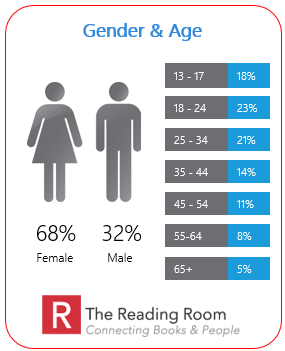Not quite six years ago, in the waning moments of the inaugural Digital Book World conference and shadow of the iPad’s disruptive (for all of the wrong reasons) reveal, I offered some closing remarks that expressed my optimism for the future of publishing.
“If we’ve learned anything from the Internet and its growth from the early days of AOL and Compuserve to the right now of blogs, Wikipedia and Google… there is an insatiable thirst for ideas. People are reading more than ever, and that’s not a threat to publishers, it’s an opportunity.”
At the time, any stance that even remotely suggested traditional publishing wasn’t actually on its death bed, or that ebooks weren’t going to be as transformational as digital music or, god forbid, that maybe the iPad wasn’t the publishing savior every tech fetishist insisted it would be — any sense of optimism that the industry could survive, maybe even thrive, was met with scorn and snark. And not just from outsiders with no skin in the game but, way too many times, the call was coming from in the house, often full of self-loathing and desperate for attention.
And yet, in these final days of 2015, here we are, with a traditional publishing industry that’s evolved to include new players and business models, alongside an independent publishing industry that’s steadily growing and continually evolving, too. We’ve seen a variety of interesting and ill-conceived experiments on both sides come and go, lip service still being paid to independent booksellers and libraries who soldier on anyway, and pundits who randomly move the goal posts whenever’s convenient.
What we haven’t seen are the radical disruptions that so many predicted were right on the horizon… there? No, over here? Wait, there it— #cmonson
NOT DEAD YET!
The generation of young readers now entering their adult years had a richer diet of superb books published for them than any before. Raised on “Harry Potter,” “The Hunger Games” and “The Fault in Our Stars,” they’ve had books as a huge part of their lives, and have watched those books become excellent movies, expanding their imaginative hold. Having grown up online, they are all of necessity writers and readers. As this generation comes to the market over the next decades, their demand for great and exciting books will fuel a huge growth in writing and reading.
Wannabe disruptors make bold, unsupported claims, get adoring praise. Publishing CEO makes pragmatic statement, gets snark. #cmonson
— Guy L. Gonzalez (@glecharles) December 2, 2015
 I was amused and annoyed by the predictable snark on Twitter in reaction to Pietsch’s op-ed, but not really surprised. What did surprise me was his unexpected validation of one of the primary reasons I unexpectedly (to most, myself included) joined a publishing startup two months ago.
I was amused and annoyed by the predictable snark on Twitter in reaction to Pietsch’s op-ed, but not really surprised. What did surprise me was his unexpected validation of one of the primary reasons I unexpectedly (to most, myself included) joined a publishing startup two months ago.
As of October, I’m the father of TWO teenagers, and the list of things that make me feel like the proverbial old man yelling at kids to get off his lawn seems to grow longer with each passing year. Tumblr, Instagram, Snapchat, Twitch, memes, emoji… OMFG!!!
In the spirit of “Go with what is. Use what happens.” though, one of the main things that intrigued me about the new gig was the audience they’ve attracted: 76% of our registered members are younger than me!
In a member survey we conducted in October, right after I started, 66% of our US members reported reading more than 48 books per year; 38% spend more than $26/month on books; and 78% still read print. (On a delightful side note, 72% also borrow print, ebooks, and audiobooks from the library. LJ‘s Patron Profiles finding that borrowers are buyers still holds up, haters!)
WE’RE ALL DIGITAL IMMIGRANTS
I’ve never bought into the idea that so-called “digital natives” would turn away from print anytime soon, or that they’d be too distracted by Angry Birds and Candy Crush to bother reading anymore, partly because the term “digital natives” is stupid and reductive.
I was born in 1969 and grew up with an Atari 2600 and Commodore 64; I made short FILMS with my G.I. Joe figures and a Super 8 camera; I self-published a newsletter for my high school fantasy football league with desktop publishing software and a dot-matrix printer. Years later, I learned more about the internet from four old white guys than most 25-year-olds will ever know; everything else I taught myself.
Lately, I’ve been fascinated by my teenage son’s reading tastes evolving almost identically to how mine did at his age, and how he decides between reading something in print vs. ebook, or juggling between reading, playing games, and watching movies. After a few fits and starts, he’s now starting to make his own videos, too.
And yet, as of December 3, 2015, despite viral YouTube videos that imply otherwise, I haven’t seen any news reports that someone’s been born with a computer chip in their brain and USB port in their ass, so there are no digital natives, only digital immigrants.
STILL AN OPTIMIST
I am thrilled that, six years after taking on the mantle of “Chief Executive Optimist” at Digital Book World and, later, seeing it outlast its more antagonistic competition, there’s still a sense of optimism about the industry’s future. I’ve certainly had that optimistic outlook challenged over the years, especially when it came to seeing firsthand how libraries are mistreated and devalued (again, the call is usually coming from in the house!), but I’m thankful for Pietsch’s optimism.
The ebook dust may be finally settling but the industry itself still has a lot more changes looming on the horizon and no one should pretend otherwise. What hasn’t changed, though, is our insatiable thirst for ideas, for stories told in a variety of media and formats, including books.
As Pietsch noted, the generations coming behind us are both actively engaged consumers AND inspired creators with their own stories to tell; the publishers (and publishing-adjacent partners) who are able to meet them halfway and engage authentically have nothing but blue sky ahead.
UPDATE [4/29/16]: After six months, I left The Reading Room at the end of March 2016. An interesting experience that I’ll fully unpack one of these days, but suffice to say, most startups fail to gain traction for a variety of reasons, but the most common one is misreading a gap in the market, especially when personal benchmarking is at play.
Do you like email?
Sign up here to get my bi-weekly "newsletter" and/or receive every new blog post delivered right to your inbox. (Burner emails are fine. I get it!)


